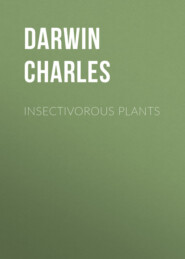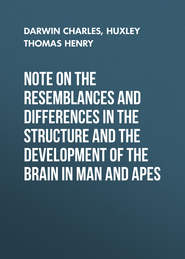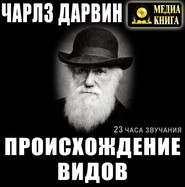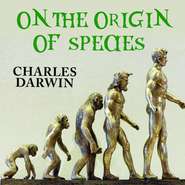По всем вопросам обращайтесь на: info@litportal.ru
(©) 2003-2024.
✖
Life and Letters of Charles Darwin — Volume 2
Настройки чтения
Размер шрифта
Высота строк
Поля
P.S. — It was absurdly stupid in me, but I had read the announcement of your Lecture, and thought that you meant the maturity of the subject, until my wife one day remarked, "it is almost twenty-one years since the 'Origin' appeared," and then for the first time the meaning of your words flashed on me!
[In the above-mentioned lecture Mr. Huxley made a strong point of the accumulation of palaeontological evidence which the years between 1859 and 1880 have given us in favour of Evolution. On this subject my father wrote (August 31, 1880):]
My dear Professor Marsh,
I received some time ago your very kind note of July 28th, and yesterday the magnificent volume. (Odontornithes. A Monograph on the extinct Toothed Birds of North America. 1880. By O.C. Marsh.) I have looked with renewed admiration at the plates, and will soon read the text. Your work on these old birds, and on the many fossil animals of North America has afforded the best support to the theory of Evolution, which has appeared within the last twenty years. (Mr. Huxley has well pointed out ('Science and Culture,' page 317) that: "In 1875, the discovery of the toothed birds of the cretaceous formation in North America, by Prof. Marsh, completed the series of transitional forms between birds and reptiles, and removed Mr. Darwin's proposition that, 'many animal forms of life have been utterly lost, through which the early progenitors of birds were formerly connected with the early progenitors of the other vertebrate classes,' from the region of hypothesis to that of demonstrable fact.") The general appearance of the copy which you have sent me is worthy of its contents, and I can say nothing stronger than this.
With cordial thanks, believe me, Yours very sincerely, CHARLES DARWIN.
[In November, 1880, he received an account of a flood in Brazil, from which his friend Fritz Muller had barely escaped with his life. My father immediately wrote to Hermann Muller anxiously enquiring whether his brother had lost books, instruments, etc., by this accident, and begging in that case "for the sake of science, so that science should not suffer," to be allowed to help in making good the loss. Fortunately, however, the injury to Fritz Muller's possessions was not so great as was expected, and the incident remains only as a memento, which I trust cannot be otherwise than pleasing to the survivor, of the friendship of the two naturalists.
In 'Nature' (November 11, 1880) appeared a letter from my father, which is, I believe, the only instance in which he wrote publicly with anything like severity. The late Sir Wyville Thomson wrote, in the Introduction to the 'Voyage of the "Challenger"': "The character of the abyssal fauna refuses to give the least support to the theory which refers the evolution of species to extreme variation guided only by natural selection." My father, after characterising these remarks as a "standard of criticism, not uncommonly reached by theologians and metaphysicians," goes on to take exception to the term "extreme variation," and challenges Sir Wyville to name any one who has "said that the evolution of species depends only on natural selection." The letter closes with an imaginary scene between Sir Wyville and a breeder, in which Sir Wyville criticises artificial selection in a somewhat similar manner. The breeder is silent, but on the departure of his critic he is supposed to make use of "emphatic but irreverent language about naturalists." The letter, as originally written, ended with a quotation from Sedgwick on the invulnerability of those who write on what they do not understand, but this was omitted on the advice of a friend, and curiously enough a friend whose combativeness in the good cause my father had occasionally curbed.]
CHARLES DARWIN TO G.J. ROMANES. Down, April 16, 1881.
My dear Romanes,
My MS. on 'Worms' has been sent to the printers, so I am going to amuse myself by scribbling to you on a few points; but you must not waste your time in answering at any length this scribble.
Firstly, your letter on intelligence was very useful to me and I tor up and re-wrote what I sent to you. I have not attempted to define intelligence; but have quoted your remarks on experience, and have shown how far they apply to worms. It seems to me that they must be said to work with some intelligence, anyhow they are not guided by a blind instinct.
Secondly, I was greatly interested by the abstract in 'Nature' of your work on Echinoderms ("On the locomotor system of Echinoderms," by G.J. Romanes and J. Cossar Ewart. 'Philosophical Transactions,' 1881, page 829.), the complexity with simplicity, and with such curious co-ordination of the nervous system is marvellous; and you showed me before what splendid gymnastic feats they can perform.
Thirdly, Dr. Roux has sent me a book just published by him: 'Der Kampf der Theile,' etc., 1881 (240 pages in length).
He is manifestly a well-read physiologist and pathologist, and from his position a good anatomist. It is full of reasoning, and this in German is very difficult to me, so that I have only skimmed through each page; here and there reading with a little more care. As far as I can imperfectly judge, it is the most important book on Evolution, which has appeared for some time. I believe that G.H. Lewes hinted at the same fundamental idea, viz. that there is a struggle going on within every organism between the organic molecules, the cells and the organs. I think that his basis is, that every cell which best performs its function is, in consequence, at the same time best nourished and best propagates its kind. The book does not touch on mental phenomena, but there is much discussion on rudimentary or atrophied parts, to which subject you formerly attended. Now if you would like to read this book, I would sent it... If you read it, and are struck with it (but I may be WHOLLY mistaken about its value), you would do a public service by analysing and criticising it in 'Nature.'
Dr. Roux makes, I think, a gigantic oversight in never considering plants; these would simplify the problem for him.
Fourthly, I do not know whether you will discuss in your book on the mind of animals any of the more complex and wonderful instincts. It is unsatisfactory work, as there can be no fossilised instincts, and the sole guide is their state in other members of the same order, and mere PROBABILITY.
But if you do discuss any (and it will perhaps be expected of you), I should think that you could not select a better case than that of the sand wasps, which paralyse their prey, as formerly described by Fabre, in his wonderful paper in the 'Annales des Sciences,' and since amplified in his admirable 'Souvenirs.'
Whilst reading this latter book, I speculated a little on the subject. Astonishing nonsense is often spoken of the sand wasp's knowledge of anatomy. Now will any one say that the Gauchos on the plains of La Plata have such knowledge, yet I have often seen them pith a struggling and lassoed cow on the ground with unerring skill, which no mere anatomist could imitate. The pointed knife was infallibly driven in between the vertebrae by a single slight thrust. I presume that the art was first discovered by chance, and that each young Gaucho sees exactly how the others do it, and then with a very little practice learns the art. Now I suppose that the sand wasps originally merely killed their prey by stinging them in many places (see page 129 of Fabre's 'Souvenirs,' and page 241) on the lower and softest side of the body — and that to sting a certain segment was found by far the most successful method; and was inherited like the tendency of a bulldog to pin the nose of a bull, or of a ferret to bite the cerebellum. It would not be a very great step in advance to prick the ganglion of its prey only slightly, and thus to give its larvae fresh meat instead of old dried meat. Though Fabre insists so strongly on the unvarying character of instinct, yet it is shown that there is some variability, as at pages 176, 177.
I fear that I shall have utterly wearied you with my scribbling and bad handwriting.
My dear Romanes, yours, very sincerely, CH. DARWIN.
POSTSCRIPT OF A LETTER TO PROFESSOR A. AGASSIZ, MAY 5TH, 1881: —
I read with much interest your address before the American Association. However true your remarks on the genealogies of the several groups may be, I hope and believe that you have over-estimated the difficulties to be encountered in the future: — A few days after reading your address, I interpreted to myself your remarks on one point (I hope in some degree correctly) in the following fashion: —
Any character of an ancient, generalised, or intermediate form may, and often does, re-appear in its descendants, after countless generations, and this explains the extraordinarily complicated affinities of existing groups. This idea seems to me to throw a flood of light on the lines, sometimes used to represent affinities, which radiate in all directions, often to very distant sub-groups, — a difficulty which has haunted me for half a century. A strong case could be made out in favour of believing in such reversion after immense intervals of time. I wish the idea had been put into my head in old days, for I shall never again write on difficult subjects, as I have seen too many cases of old men becoming feeble in their minds, without being in the least conscious of it. If I have interpreted your ideas at all correctly, I hope that you will re-urge, on any fitting occasion, your view. I have mentioned it to a few persons capable of judging, and it seemed quite new to them. I beg you to forgive the proverbial garrulity of old age.
C.D.
[The following letter refers to Sir J.D. Hooker's Geographical address at the York Meeting (1881) of the British Association:]
CHARLES DARWIN TO J.D. HOOKER. Down, August 6, 1881.
My dear Hooker,
For Heaven's sake never speak of boring me, as it would be the greatest pleasure to aid you in the slightest degree and your letter has interested me exceedingly. I will go through your points seriatim, but I have never attended much to the history of any subject, and my memory has become atrociously bad. It will therefore be a mere chance whether any of my remarks are of any use.
Your idea, to show what travellers have done, seems to me a brilliant and just one, especially considering your audience.
1. I know nothing about Tournefort's works.
2. I believe that you are fully right in calling Humboldt the greatest scientific traveller who ever lived, I have lately read two or three volumes again. His Geology is funny stuff; but that merely means that he was not in advance of his age. I should say he was wonderful, more for his near approach to omniscience than for originality. Whether or not his position as a scientific man is as eminent as we think, you might truly call him the parent of a grand progeny of scientific travellers, who, taken together, have done much for science.
3. It seems to me quite just to give Lyell (and secondarily E. Forbes) a very prominent place.
4. Dana was, I believe, the first man who maintained the permanence of continents and the great oceans... When I read the 'Challenger's' conclusion that sediment from the land is not deposited at greater distances than 200 or 300 miles from the land, I was much strengthened in my old belief. Wallace seems to me to have argued the case excellently. Nevertheless, I would speak, if I were in your place, rather cautiously; for T. Mellard Reade has argued lately with some force against the view; but I cannot call to mind his arguments. If forced to express a judgment, I should abide by the view of approximate permanence since Cambrian days.
5. The extreme importance of the Arctic fossil-plants, is self-evident. Take the opportunity of groaning over [our] ignorance of the Lignite Plants of Kerguelen Land, or any Antarctic land. It might do good.
6. I cannot avoid feeling sceptical about the travelling of plants from the North EXCEPT DURING THE TERTIARY PERIOD. It may of course have been so and probably was so from one of the two poles at the earliest period, during Pre-Cambrian ages; but such speculations seem to me hardly scientific seeing how little we know of the old Floras.
I will now jot down without any order a few miscellaneous remarks.
I think you ought to allude to Alph. De Candolle's great book, for though it (like almost everything else) is washed out of my mind, yet I remember most distinctly thinking it a very valuable work. Anyhow, you might allude to his excellent account of the history of all cultivated plants.
How shall you manage to allude to your New Zealand and Tierra del Fuego work? if you do not allude to them you will be scandalously unjust.
The many Angiosperm plants in the Cretacean beds of the United States (and as far as I can judge the age of these beds has been fairly well made out) seems to me a fact of very great importance, so is their relation to the existing flora of the United States under an Evolutionary point of view. Have not some Australian extinct forms been lately found in Australia? or have I dreamed it?
Again, the recent discovery of plants rather low down in our Silurian beds is very important.
Nothing is more extraordinary in the history of the Vegetable Kingdom, as it seems to me, than the APPARENTLY very sudden or abrupt development of the higher plants. I have sometimes speculated whether there did not exist somewhere during long ages an extremely isolated continent, perhaps near the South Pole.
Hence I was greatly interested by a view which Saporta propounded to me, a few years ago, at great length in MS. and which I fancy he has since published, as I urged him to do — viz., that as soon as flower-frequenting insects were developed, during the latter part of the secondary period, an enormous impulse was given to the development of the higher plants by cross-fertilization being thus suddenly formed.
A few years ago I was much struck with Axel Blytt's Essay showing from observation, on the peat beds in Scandinavia, that there had apparently been long periods with more rain and other with less rain (perhaps connected with Croll's recurrent astronomical periods), and that these periods had largely determined the present distribution of the plants of Norway and Sweden. This seemed to me, a very important essay.
I have just read over my remarks and I fear that they will not be of the slightest use to you.
I cannot but think that you have got through the hardest, or at least the most difficult, part of your work in having made so good and striking a sketch of what you intend to say; but I can quite understand how you must groan over the great necessary labour.
I most heartily sympathise with you on the successes of B. and R.: as years advance what happens to oneself becomes of very little consequence, in comparison with the careers of our children.
Keep your spirits up, for I am convinced that you will make an excellent address.
Ever yours, affectionately, CHARLES DARWIN.
[In September he wrote: —
"I have this minute finished reading your splendid but too short address. I cannot doubt that it will have been fully appreciated by the Geographers of York; if not, they are asses and fools."]
















